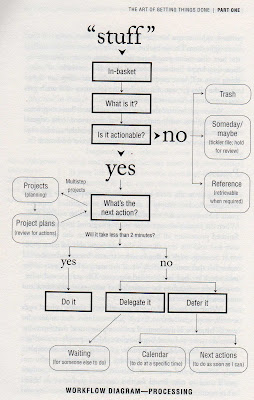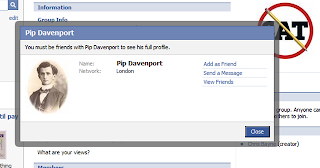Chapter TwoAdapted from David Allen's Getting Things Done
No matter what the setting, there are five discrete stages that we go through as we deal with our work. We
- Collect things that command our attention;
- Process what they mean and what to do about them; and
- Organise the results, which we
- Review as options for what we choose to
- Do.
Collect
In order to manage the different tasks that we collect, we need to create 'containers' that hold items until you have a few moments to decide what they are and what, if anything, you're going to do about them. Then you must empty these containers regularly to ensure that they remain viable collection tools. What we're talking about here is making sure that everything you need is collected somewhere other than in your head.
There are several types of tools that can be used to collect your incomplete tasks:
- Physical in-basket
- Writing paper and pads
- Computers, e.g. http://www.toodledo.com/
- Auditory capture, e.g. answering machine or dictaphone
- Email
In order to make these in-baskets work:
- Every open loop must be in your collection system and out of your head.
- You must have as few collection buckets as you can get by with.
- You must empty them regularly.
If you don't empty and process the stuff you've collected, your buckets aren't serving any function other than the storage of amorphous material. Emptying doesn't mean that you have to finish everything. It means that you have to take it out of the container, decide what it is and what should be done with it, and if it's still unfinished, organise it into your system.
Process
 This flow chart shows the basic structure for effective processing.
This flow chart shows the basic structure for effective processing.
Organise
This stage refers to the categories in rings round the outside of the diagram, resulting from the processing of your stuff. Together they make up a total system for organising just about everything that's on your plate, or could be added to it, on a daily and weekly basis.
For nonactionable items, you need to trash, incubate and store for reference. If no action is needed, you throw it, to incubate you hold it to reassess later, or you could file it for reference at a later time. To manage actionable things you need a list of projects, storage or files for project plans and materials, a calendar, a list of reminders of next actions and a list of reminders of things you're waiting for.
Projects: A project is a desired result that requires more than one action step. If one step won't complete something, some kind of stake needs to be placed in the ground to remind you that there's something still left to do. You don't actually do a project, you can only do action steps related to it. When enough of the right action steps have been taken, some situation will have been created that matches your initial picture of the outcome closely enough that you can call it 'done'.
Support materials and reference files should be kept out of sight, but close at hand.
Calendars: Calendars should be used for next-actions. Three things go on your calendar: time-specific actions, day-specific actions and day-specific information.
- Time-specific actions: This is a fancy name for appointments.
- Day-specific actions: These are things that you need to do sometime on a certain day, but not necessarily at a specific time.
- Day-specific information: Use your calendar to keep track of things you want to know about on specific days - not actions you'll have to take, but rather information that may be useful on a certain date.
Daily To Do Lists: These don't work, for two reasons:
- New priorities reconfigure daily work so consistently that it's virtually impossible to nail down to do items ahead of time.
- If there's something on the list that doesn't absolutely have to get done that day, it dilutes the emphasis on the things that truly do.
Next action lists: You action reminders go here. Any longer than two minute nondelagatable actions you have identified should be tracked here.
Incubation: This is where you store your ideas for projects that you might want to do someday, but not now. There are two types of systems:
- Someday/ Maybe: It can be useful and inspiring to maintain an ongoing list of things you might want to do at some point but not now. This is the parking lot for projects that would be impossible to move on at present but that you don't want to forget about entirely. You'd like to be reminded of the possibility at regular intervals.
- Tickler file: This is a system that allows you to almost literally mail something to yourself for receipt on some designated day in the future, e.g. your calendar.
Review
- The item you'll probably review most frequently is your calendar. It's a good habit, as soon as you conclude an action on your calendar to check and see what else needs to be done.
- Then you'll check your Next Actions list.
- Each week you need a weekly review.
Weekly Review: This is the time to:
- Gather and process all your stuff
- Review your system
- Update your lists
- Get clean, clear, current and complete.
What do you do the last week before you leave on a big trip? You clean up, close up, clarify and renegotiate all your agreements with yourself and others. I suggest you do this weekly instead of yearly.
Do
There will always be a large list of actions that you are not doing at any given moment. So how will you decide what to do and what not to do and feel good about both? The answer is, by trusting your intuition. Apply these four criteria to help you decide:
- Context: A few actions can be done anywhere, but most require a specific location.
- Time available: When do you have to do something else?
- Energy available: How much energy do you have?
- Priority: Given your context, time and energy available, what action will give you the highest payoff?

 Research
Research


